One of the most popular anti-theft devices installed in cars is the immobiliser. Currently, each vehicle destined for the European market is fitted with such a solution.

Here, we check how the immobiliser works and whether it is effective in preventing cars from being stolen.
ADVERTISEMENT
Car manufacturers are installing increasingly advanced anti-theft devices in the vehicles they produce. Immobilisers are no longer a novelty, but a norm. Their today's popularity results from two factors: first, they are automatic (the user does not need to remember to activate them); second, according to research published in the Economic Journal, the common use of immobilisers has decreased the number of stolen vehicles by 40%.
What is an immobiliser, how is it built and how does it work?
An immobiliser is an electronic anti-theft device used in mechanical vehicles. It prevents the engine from starting.
This effect can be achieved in a number of ways, e.g. by blocking engine ignition or the computer controlling the work of the ignition system. An immobiliser is not a complex device and consists of two elements:
a. transponder – depending on the production year of the vehicle, it can come in the form of a remote control (then, it needs to be brought close to the steering column) or can be integrated in the car key or a card;
b. central unit or engine controller – they are fitted inside the vehicle.
How does an immobiliser work?
In order to unlock the engine, the driver needs to put the key in the ignition, after which signals are exchanged. Simply put, it works as follows: first, an electromagnetic field induces voltage in the system of the transponder (key), which transmits a unique code. This code is received and checked by the engine control module. Then, the controller emits its own code, received by the transponder, in order to verify the key.
Although the functioning of an immobiliser may appear complicated, in practice it only takes a fraction of a second to compare the signals. This means that this process is imperceptible to the driver. Depending on the solutions used by the manufacturer, when the codes are incompatible, the engine cannot be started or it will be turned off after a short while.
Why is it worth buying full cover and roadside assistance package on top of an immobiliser fitted in a car?
In order to minimise the risk of car theft, countries have begun to make it obligatory for car manufacturers to install immobilisers. For instance, since 1998, this solution has been obligatory for new cars offered in Germany, the UK and Finland. Much later, because only in 2007, the same requirement was introduced by Canada.
Full cover insurance is a product from the category of voluntary (additional) vehicle insurance. It guarantees a payment of compensation in case of a car theft, among others. How much does full cover insurance cost?
The price of full cover insurance depends on multiple factors, including most of all the value, make and model of the car as well as the insurance history of the driver. In the case of full cover, insurance companies also inquire about anti-theft devices installed in the car. In order for an insurance company to present an offer, it is necessary to declare at least one safety device.
Not only the owners of new vehicles should consider buying additional insurance policies. The older the car, the higher the risk of a failure. Especially those drivers who are afraid of a failure (including immobiliser failure) and often travel on longer routes should consider buying roadside assistance insurance. It guarantees the insurer's help in case of random events. Under this policy, the insured parties are provided with e.g. towing services.
Source: insurance comparison site rankomat
 Subscribe today by clicking the link and stay updated with the latest news!" Click here!
Subscribe today by clicking the link and stay updated with the latest news!" Click here!







